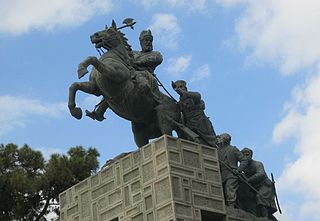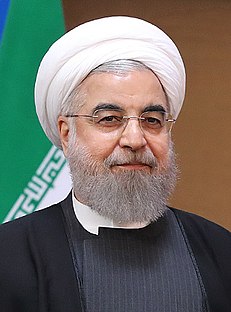| ||||
905 City and 34,205 Village Councils | ||||
| Registered | 41,501,783 [1] | |||
| Turnout | 49.96% [1] | |||
| ||||
| ||||
Iranian City and Village Councils elections, 2003 took place in February 2003, the second time local elections for city and village councils had taken place since being introduced in 1999, and 905 city and 34,205 village councils were up for election. [4]

City and Village Councils are local councils which are elected by public vote in all cities and villages throughout Iran. Council members in each city or village are elected by direct public vote to a 4-year term.
Contents
By the elections, conservatives made a comeback and won the majority of the seats nationally as a harbinger of the 2004 parliamentary elections, where they won decisively. [4]
The Principlists also interchangeably known as the Iranian Conservatives and formerly referred to as the Right or Right-wing, are one of two main political camps inside post-revolutionary Iran, the other being Reformists. The term ‘hardliners’ that some western sources use in the Iranian political context, usually refers to the faction, despite the fact it includes also more centrist tendencies.
The elections demonstrated a voter apathy among the urban citizens, [5] as a result of public disappointment with reformists [4] and constant political infighting which led to the dissolution of the reformist-dominated City Council of Tehran. [6]
In politics, voter apathy is perceived apathy among voters in an election. Voter apathy or lack of interest is often cited as a cause of low turnout among eligible voters in jurisdictions where voting is optional and the donkey vote where voting is compulsory. Voter fatigue describes a possible cause of voter apathy: elections that are held too frequently.

The Iranian reformists are a political faction in Iran that support former President Mohammad Khatami's plans to change the Iranian political system to include more freedom and democracy. Iran's "reform era" is sometimes said to have lasted from 1997 to 2005—the length of Khatami's two terms in office. The Council for Coordinating the Reforms Front is the main umbrella organization and coalition within the movement; however, there are reformist groups not aligned with the council, such as the Reformists Front.
There were 20,235,898 casted votes in this election, [1] marking the lowest turnout in 24 years. In Tehran, only 12% of eligible voters participated. Turnout in Isfahan and Mashhad showed similar rates, 12% and 15% respectively. [7]

Tehran is the capital of Iran and Tehran Province. With a population of around 8.694 million in the city and 15 million in the larger metropolitan area of Greater Tehran, Tehran is the most populous city in Iran and Western Asia, and has the second-largest metropolitan area in the Middle East. It is ranked 24th in the world by the population of its metropolitan area.

Isfahan is a city in Iran. It is located 406 kilometres south of Tehran, and is the capital of Isfahan Province.

Mashhad, also spelled Mashad or Meshad, is the second most populous city in Iran and the capital of Razavi Khorasan Province. It is located in the northeast of the country, near the borders with Turkmenistan and Afghanistan. It has a population of 3,001,184 inhabitants, which includes the areas of Mashhad Taman and Torqabeh. It was a major oasis along the ancient Silk Road connecting with Merv to the east.
Disqualifications were minimal and below the 10%, to the extent that the banned Freedom Movement of Iran and Nationalist–Religious activists secured a few candidates as independents. [8]

The Freedom Movement of Iran (FMI) or Liberation Movement of Iran is an Iranian pro-democracy political organization founded in 1961, by members describing themselves as "Muslims, Iranians, Constitutionalists and Mossadeghists". It is the oldest party still active in Iran and has been described as a "semi-opposition" or "loyal opposition" party. It has also been described as a "religious nationalist party".
The Council of Nationalist-Religious Activists of Iran or The Coalition of National-Religious Forces of Iran is an Iranian political group, described as "nonviolent, religious semi-opposition" with a following of mainly middle class, intellectual, representatives of technical professions, students and technocrats.










